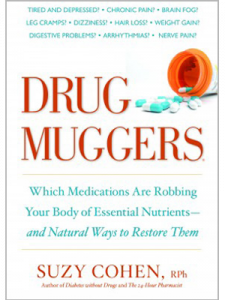What's On This Page?
ToggleIngredients similar to aspirin were extracted from meadowsweet and willow bark centuries ago, bit in 1899, salicin was altered into a patentable drug called aspirin which is abbreviated as ASA for “acetylsalicylic acid.” Notice the prefix “acetyl” on that, because I will come back to that at the end of this article.

Aspirin was approved for the treatment of gout and rheumatic fever, but today we know it as an anti-clotting agent, and pain reliever. Around 100 billion aspirin tablets are produced every year. Aspirin is a “salicylate” compound and millions of people are unknowingly allergic to salicylates, mainly because the foods that it occurs in naturally are not very similar.
For example, broccoli, olives, Coca Cola, breath mints, pistachios, mushrooms and coffee have nothing obvious in common, so you’d never trace a salicylate allergy to these foods. Yet they all contain salicylates, similar to aspirin. So if you’re reactive to any of those foods, it’s a clue you might have a salicylate allergy.
Salicylates are found in dozens of foods that aren’t similar.
Symptoms that may occur include headaches, asthma, wheezing, nausea, diarrhea, stomach upset, itching, rash, swelling of your hands, feet, or your face or sinus symptoms.
Your throat may get itchy, painful or swollen, or your lips may swell. If you experience these or other symptoms, it could very well be the ‘aspirin’ in your food, termed a salicylate allergy. People who know they are allergic to aspirin know to avoid other over-the-counter medications which may contain aspirin such as cold or flu remedies, antacids, menstrual cycle pain-relievers, certain fizzy antacids, teething gel, or toothache remedies.
Some of you who are allergic to aspirin can actually eat some salicylate-rich foods without a problem. And then there’s a subset of people (maybe you) who eat foods and suffer, and don’t know why.
Nuts and seeds contain salicylates and if you’re allergic to those, it might be due to the aspirin-like compound. The nuts and seeds that contain a lot of salicylates are almonds, peanuts, pine nuts and pistachios, as well as my favorite nut, the macadamia! Lower down on the salicylate content are the nuts and seeds as follows: Brazil nuts, pecans and sesame seeds (tahini) as well as sunflower seeds and hazelnuts. Cashews which aren’t really “nuts” contain negligible amounts of salicylates.
And finally, there are some of you who need the benefits of aspirin, and want to eat salicylates through natural sources. So the following list of foods high in salicylate will serve a different purpose for all of you, depending on what category you fall into.
 Natural Aspirin is found in the following:
Natural Aspirin is found in the following:
**Note: Fruits and vegetables are higher in salicylates when not ripe**
Apples
Apricots
Avocados
Blackberries
Blueberries
Broccoli
Cantaloupe
Cauliflower
Cherries
Chili peppers
Cucumbers
Currants
Dates Dried herbs/spices
Eggplant
Figs
Grapefruit
Grapes Green peppers Guava
Kiwi
Licorice herb (candy is okay)
Meadowsweet
Mint (gum, breath mints, toothpaste)
Nuts, all of them, pistachios, pine nuts, almonds, peanuts etc.
Paprika
Peaches
Plums
Prunes
Radishes
Raspberries
Spinach
Strawberries
Turmeric Wine
Zucchini
You might be wondering why a handful of you can eat salicylate-rich foods when you are allergic to aspirin. It’s because aspirin contains an “acetyl” molecule on the compound because that acetyl group was attached to it in order to turn the natural herb into a drug. Naturally-occurring salicylates do not have this acetyl group and that’s what usually triggers the reaction.
This may also be what cause the annoying tinnitus that some of you get when you are exposed to aspirin or other salicylate-drugs. The best way to find out if salicylates in your food are causing your symptoms is by avoiding high salicylate foods a month or two and watch for improvements.
Salicylate-free diets are not in vogue yet, but I personally recommend them if you are:
1) Allergic to aspirin
2) If you react to three or more items on the above list.
3) If you have tinnitus that is not from anything obvious (ie your medicine)
4) Experienced anaphylaxis in the past to any one of the items above
Now I want to circle back to the the topic of salicylates and how they induce ear-ringing, termed tinnitus. Higher doses of salicylates temporarily induces hearing loss and high-pitch sounds in both animals and people. It’s annoying as heck, and if this is not induced by a drug you take, for example furosemide, or benzodiazepines (Xanax, Klonopin, Ativan, etc) then I would emphasize trying the salicylate-free diet for a couple of months. It can’t hurt and it might solve the tinnitus.
If you have a mild food sensitivity to a salicylate-rich food you can try a home remedy as an antidote. Here’s what people suggest: Mix about a 1/2 teaspoon of baking soda in a big glass of water and sip it. Ask your doctor if any of my tips are right for you, because health and diets are such a personal journey.
What about if you take aspirin once daily for it’s platelet and blood-thinning effects?
I want to make you aware that aspirin is a drug mugger of vitamin C, and you may become slightly deficient in C if you take aspirin daily.
 A deficiency of Vitamin C could result in changes to your cholesterol, skin integrity, ability to heal wounds, elasticity of your arteries and immune system. If you have problems in these areas, and you take aspirin daily (or other drug muggers of vitamin C, see my Drug Muggers book), then it might be time to supplement with a high-quality form of Ester C, or eat more citrus fruits.
A deficiency of Vitamin C could result in changes to your cholesterol, skin integrity, ability to heal wounds, elasticity of your arteries and immune system. If you have problems in these areas, and you take aspirin daily (or other drug muggers of vitamin C, see my Drug Muggers book), then it might be time to supplement with a high-quality form of Ester C, or eat more citrus fruits.
Click here to read ‘Even Baby Aspirin Has Risks’.

Suzy Cohen, has been a licensed pharmacist for over 30 years and believes the best approach to chronic illness is a combination of natural medicine and conventional. She founded her own dietary supplement company specializing in custom-formulas, some of which have patents. With a special focus on functional medicine, thyroid health and drug nutrient depletion, Suzy is the author of several related books including Thyroid Healthy, Drug Muggers, Diabetes Without Drugs, and a nationally syndicated column.


